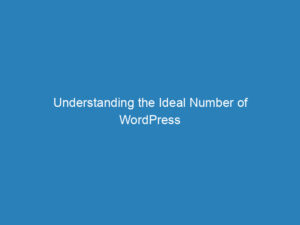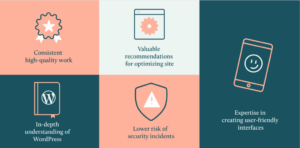
Understanding the Impact of WordPress Plugins: Quantity vs. Quality
A Deep Dive into WordPress Plugins: Quantity vs Quality
WordPress is widely recognized for its adaptability and accessibility, primarily because of plugins. These additional pieces of code make it possible to transform a basic website into an eCommerce store, a members-only platform, or a reservations and bookings site. The possibilities seem endless, and WordPress users are quick to take advantage of this by adding multiple plugins to their site.
However, despite their benefits, plugins can also be a source of major headaches for WordPress users. Misuse and overuse of plugins can lead to a host of issues that can negatively impact your website, your online store, and your users. This raises the question: How many plugins are too many?
How Many Plugins are Too Many?
Contrary to what you might expect, the answer to this question is not straightforward. The reason being, there is no one-size-fits-all approach when it comes to plugins. Each website is unique and will have different needs. Therefore, the focus should not be on the number of plugins installed, but rather on their quality and how well they integrate with your website.
Common Problems with Low-Quality WordPress Plugins
While the quantity of plugins does not necessarily cause issues, the quality certainly can. Plugins that are poorly coded or not regularly updated can result in a number of problems including security vulnerabilities, site crashes, increased HTTP requests or database queries, reliability issues, compatibility conflicts, and poor performance or slow speed.
It’s worth noting that cost-cutting on plugins can often lead to more expenses in the long run, as maintaining a site with poorly-coded plugins is more challenging.
Why Quality Should Outweigh Quantity
Despite the common belief that more plugins equate to more problems, numerous successful WordPress developers, including Pippin Williamson, have debunked this myth. Williamson, who runs 80 plugins on his website, argues that the quality of plugins is far more important than the quantity. As long as the plugins are well-built and used for their specific purpose, they should not cause issues.
But how can you ensure the plugins you’re installing are high-quality?
How to Choose High-Quality WordPress Plugins
There are a few ways to identify high-quality plugins. One of the most telling is how frequently a plugin is updated. Regular updates indicate that the plugin’s developer is actively improving and maintaining it. Additionally, look at the reputation of the plugin’s developers and the plugin’s rating. Reading user reviews can also provide valuable insights into the plugin’s performance.
However, for those who are not technically inclined, the best way to evaluate a plugin’s quality is by engaging the services of an experienced and trustworthy developer. They can assess the plugin’s quality, gauge its impact on site performance and security, and determine how well it will integrate with your current plugin stack.
Conclusion
Ultimately, the number of plugins installed on your website is not the issue. What truly matters is the quality of these plugins. High-quality plugins, which are coded well, run smoothly, are not resource-intensive, and are regularly updated, are far less likely to cause issues than their low-quality counterparts. Therefore, when it comes to WordPress plugins, it’s time to shift the focus from quantity to quality.
This article features insights from Francesco Carlucci, a seasoned technology expert and software developer specializing in enterprise-level WordPress development, custom integrations, e-commerce, and performance-oriented solutions.

